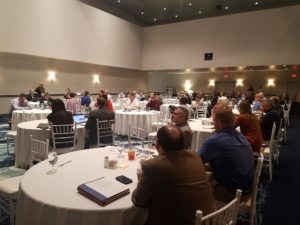GWPC Annual Forum and Source Water Protection Workshop Held This Week
 The Ground Water Protection Council (GWPC) held its Annual Forum this week in Oklahoma City that included a variety of sessions and a source water protection workshop. Approximately 270 participants attended the Forum from state water, ground water, energy, and oil and gas programs, as well as EPA, USGS, and the Department of Energy, and other associations (including ASDWA).
The Ground Water Protection Council (GWPC) held its Annual Forum this week in Oklahoma City that included a variety of sessions and a source water protection workshop. Approximately 270 participants attended the Forum from state water, ground water, energy, and oil and gas programs, as well as EPA, USGS, and the Department of Energy, and other associations (including ASDWA).
Ken Wagner, Oklahoma’s Secretary of Energy and Environment and Scott Thompson, Executive Director of Oklahoma’s Department of Environmental Quality (DEQ) opened the Forum by highlighting some of Oklahoma’s efforts focused on renewable energy; water and energy conservation; produced water and water reuse. Claudio Ternieden of the Water Environment Federation shared their activities to address drinking water, wastewater, and water reuse as well as nutrient resources and recovery. Anita Thompkins of EPA’s Drinking Water Protection Division (DWPD) wrapped up the session by presenting EPA’s efforts to streamline approaches for approving UIC permit applications and reducing backlogs; implement AWIA provisions; promote source water protection and partnerships; and develop the National Water Reuse Action Plan.
The Source Water Protection Workshop was held on the first afternoon of the Forum and was sponsored by the National Source Water Collaborative. Shellie Chard, Director of Oklahoma’s Water Quality Division in DEQ, and who is a Board Member of both GWPC and ASDWA, kicked off the workshop by sharing information about Oklahoma’s source water issues and activities. She was followed by Sal Salinas, the Central Regional Conservationist of the USDA Natural Resources Conservation Service (NRCS) and Gary O’Neill, the NRCS State Conservationist who shared information about agricultural conservation programs and partnering with NRCS on projects to implement practices that protect sources of drinking water. Other presentations and lightning talks highlighted a variety of innovative activities being undertaken in multiple states (Arkansas, Nebraska, Nevada, Delaware, Ohio, Wisconsin, West Virginia and New Hampshire) to work with state Clean Water Act, NRCS, agricultural, water utility, and other program and organization partners to develop and implement surface water and ground water protection plans and update state source water assessment programs and GIS mapping applications. Both during and at the end of the workshop, participants discussed and shared ideas and opportunities for take home actions.
Another session at the Forum that should be of interest to state drinking water programs focused on emerging contaminants and PFAS. During this session, Brandon Kernen of New Hampshire shared information about ASDWA and ACWA’s Contaminants of Emerging Concern project to provide recommendations for working with industry and optimizing the use of multiple federal regulatory programs to assess and address PFAS; and Kenneth Sansone, a lawyer from New Hampshire discussed the legal implications for lawsuits against responsible parties for PFAS contamination. For more information on other Forum sessions, such as aquifer management and produced water, visit the GWPC website.

